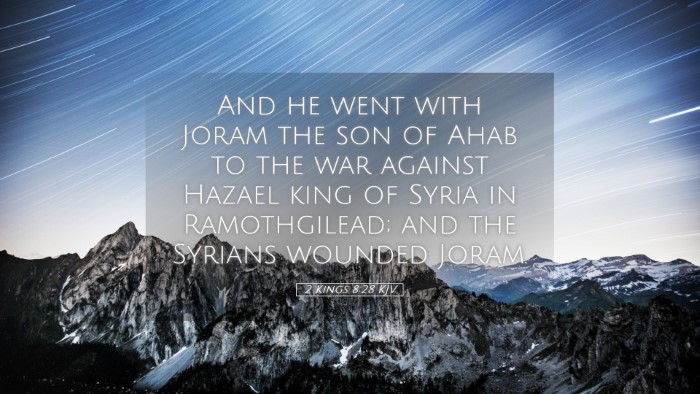Commentary on 2 Kings 8:28
Verse: "And he went with Joram the son of Ahab to war against Hazael king of Syria in Ramothgilead; and the Syrians wounded Joram."
Introduction
The passage found in 2 Kings 8:28 presents a significant moment in the history of Israel and the surrounding nations. This verse not only recounts a historical event but also serves to underline the themes of leadership, conflict, and divine sovereignty. The insights drawn from various public domain commentaries provide depth to its understanding, particularly for pastors, students, theologians, and scholars.
Contextual Setting
In the broader narrative of 2 Kings, we observe the decline of Israel due to the sins of the leaders and the people. This situation is echoed in the conflict with Syria, a recurring adversary. Joram, the son of the notorious Ahab, represents a lineage that continues in unfaithfulness. His alliance with Jehoram of Judah, indicated in this verse, not only highlights the political motivations of the time but also God's judgment at work through these historical events.
Insights from Matthew Henry
Matthew Henry emphasizes the implications of Joram's actions:
- Alliance with Joram: Joram's expedition with Jehoram illustrates a moment of collusion between two rebellious kings against a common enemy, further entangling the nation of Israel in the consequences of their sins.
- Divine Protection: Despite their alliance, the wounds received by Joram serve as a reminder of God’s diminishing favor upon Israel. Henry suggests that even in their physical prowess, they are vulnerable if they are outside of God’s will.
Reflections from Albert Barnes
Albert Barnes provides a theological reflection on this passage:
- Military Endeavors: Barnes notes that Joram’s participation in the military campaign signifies the importance of political alliances in ancient Israel. It speaks to the dire circumstances where Israel believes that human strength and alliances will secure their survival.
- Judgment of God: He stresses the fact that wounds inflicted during battle can symbolize divine judgment. Joram's injury is a warning from the Lord, indicating that regardless of alliances, disobedience leads to destruction.
Considerations from Adam Clarke
Adam Clarke offers additional insights particularly regarding the nature of warfare during this period:
- Nature of the Conflict: Clarke expounds on the historical context, noting that Ramoth-Gilead was a strategic city for both Israel and Syria. This conflict highlights the geopolitical struggles of the Israelites.
- Corruption in Leadership: Clarke points out that the partnership with Ahab’s lineage does not lead to righteousness but rather to increased corruption. Leaders are responsible for the spiritual state of their people.
Theological Implications
This verse serves as a poignant reflection on the themes of leadership, faithfulness to God, and the repercussions of turning away from divine commandments. The injury of Joram, despite his formidable positions and alliances, signifies that without divine backing, one remains susceptible to defeat.
Leadership Lessons
For contemporary leaders, this passage serves as a stern reminder:
- Importance of Godly Counsel: Leaders should seek divine wisdom over human alliances, recognizing that true strength comes from the Lord.
- Accountability: Just as Joram faces the consequences of his actions, modern leaders must also be aware of their accountability before God for the direction of their people.
Conclusion
In summary, 2 Kings 8:28 is not merely an account of military conflict but a narrative rich with warnings and insights for those who lead, serve, and study the scriptures. Through the commentary of Matthew Henry, Albert Barnes, and Adam Clarke, we gain a deeper appreciation for the historical and theological ramifications of this passage. It challenges us to reflect on our own alliances, the nature of our leadership, and the vital importance of remaining aligned with God's purposes.


